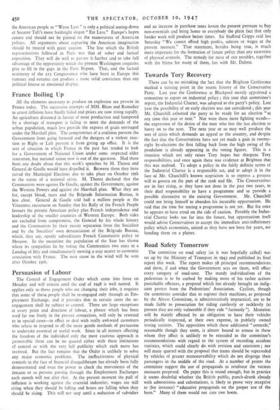Road Safety Tomorrow
The committee on road safety (as it was hopefully called) was set up by the Ministry of Transport in 1943 and published its final report this week. The report makes 58 principal recommendations. and these, if and when the Government acts on them, will affect every category of road-user. The sturdy individualism of the pedestrian is to be curbed by making more of his rasher actions punishable offences, a proposal which has already brought an indig- nant protest from the Pedestrians' Association. Cyclists, though the committee consider that to register their machines, as proposed by the Alness Committee, is administratively impractical, are to be made liable to prosecution for riding carelessly or recklessly (at present they are only vulnerable if they ride " furiously"). Motorists will be mainly affected by an obligation to have their vehicles periodically inspected, at their own expense, in publicly owned testing stations. The opposition which these additional "controls," reasonable though they seem, is almost bound to arouse in those whom they affect is unlikely to be extended to the committee's recommendations with regard to the system of recording accident statistics, which could clearly do with revision and extension ; nor will many quarrel with the proposal that trams should be superseded by vehicles of greater manoeuvrability which do not disgorge their passengers in the middle of the road. At a number of points the committee suggest the use of propaganda to reinforce the various measures proposed. On paper this is sound enough, but in practice it seems doubtful whether the British public, punch-drunk already with admonitions and exhortations, is likely to prove very receptive to (for instance) "educative propaganda on the proper use of the horn." Many of them would not care two hoots.


































 Previous page
Previous page